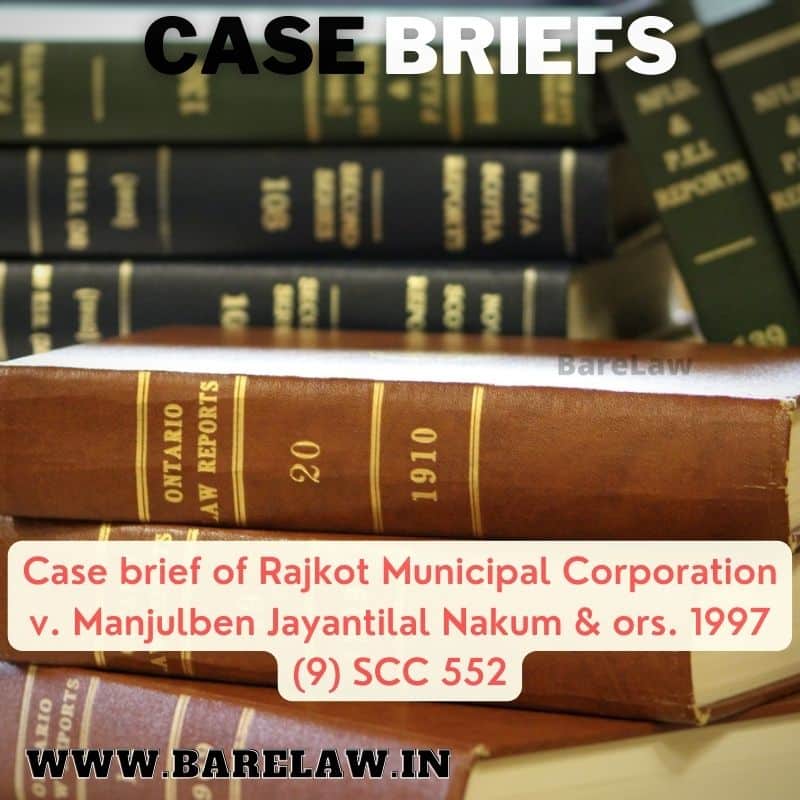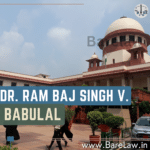
Rajkot Municipal Corporation v. Manjulben Jayantilal Nakum & ors. 1997 (9) SCC 552 is a significant case in Indian constitutional law.
The case dealt with the issue of compulsory acquisition of private property for public purposes under the provisions of the Constitution of India. The case was heard by the Supreme Court of India, and is considered one of the leading cases on the issue of compulsory acquisition of private property in India.
The background of the case is that the Rajkot Municipal Corporation had issued a notification under the provisions of the Land Acquisition Act, 1894, declaring its intention to acquire a piece of land owned by the respondent, Manjulben Jayantilal Nakum. The land was intended to be used for public purposes, including the construction of a market and a park. The respondent challenged the validity of the notification, and argued that the acquisition of the land was not for a public purpose and that the acquisition violated her fundamental rights under the Constitution of India.
The main issue before the Supreme Court was whether the acquisition of the land by the Rajkot Municipal Corporation was for a public purpose, and whether the acquisition violated the respondent’s fundamental rights under the Constitution of India. The Supreme Court noted that the provisions of the Constitution of India provided for the compulsory acquisition of private property for public purposes, but that such acquisition was subject to certain limitations and restrictions.
The Supreme Court held that the compulsory acquisition of private property for public purposes was constitutional, provided that such acquisition was for a public purpose and did not violate the fundamental rights of the person whose property was being acquired. The Supreme Court noted that the definition of “public purpose” was broad and included a wide range of activities that served the public interest, including the construction of markets and parks. The Supreme Court also held that the acquisition of the land by the Rajkot Municipal Corporation was for a public purpose, and that it did not violate the respondent’s fundamental rights under the Constitution of India.
This case is significant because it dealt with the issue of compulsory acquisition of private property for public purposes under the provisions of the Constitution of India. The case helped to clarify the scope of the provisions of the Constitution of India regarding compulsory acquisition of private property, and to provide guidance on the interpretation of the term “public purpose”. The case also confirmed the principle that the compulsory acquisition of private property for public purposes was constitutional, provided that such acquisition was for a public purpose and did not violate the fundamental rights of the person whose property was being acquired.
The case has been widely cited in subsequent cases and is considered a leading case on the issue of compulsory acquisition of private property in India. The case has helped to clarify the legal framework for compulsory acquisition of private property in India, and to provide guidance on the interpretation of the term “public purpose”. The case is also significant because it helped to ensure that the rights of property owners are protected, and that compulsory acquisition of private property is carried out in a fair and transparent manner.
In conclusion, the case of Rajkot Municipal Corporation v. Manjulben Jayantilal Nakum & ors. 1997 (9) SCC 552 is a significant case in Indian constitutional law, and has helped to provide guidance on the issue of compulsory acquisition of private property for public purposes in India. The case has clarified the provisions of the Constitution of India regarding compulsory acquisition of private property, and has helped to ensure that the rights of property owners are protected and that compulsory acquisition is carried out in a fair and transparent manner.
Also read – https://indiankanoon.org/doc/1075762/





